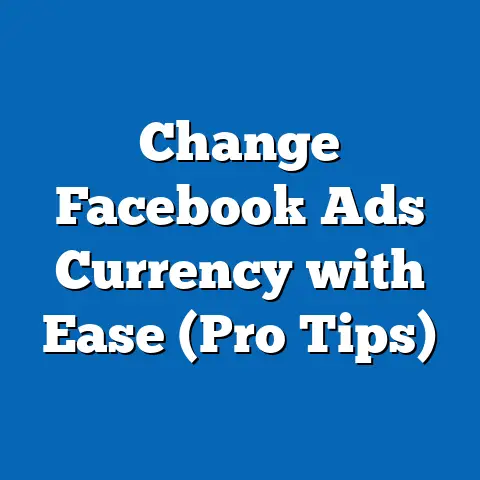Can You Run Crypto Ads on Facebook? (Essential Guide)
The sky this morning was a brilliant, cloudless blue, promising a day of predictable sunshine.
I grabbed my coffee, thinking about the marketing campaigns I was planning for the week, a sense of calm certainty washing over me.
But as I checked my weather app, a stark contrast appeared: a severe thunderstorm warning flashing across the screen.
It was a sharp reminder that things can change in an instant, a lesson that resonates deeply with anyone involved in the world of cryptocurrency.
Just like the weather, the crypto market is known for its rapid, often unpredictable shifts, and navigating the world of crypto advertising on platforms like Facebook can feel just as volatile.
One day you’re riding high, the next you’re facing a barrage of regulatory hurdles and policy changes.
So, can you even run crypto ads on Facebook?
The answer, as with most things crypto, is nuanced.
Let’s dive in.
Understanding Facebook’s Advertising Policies
Facebook, now Meta, is a behemoth.
It’s not just a social network; it’s a global town square, a marketplace, and for many businesses, a critical advertising platform.
Boasting billions of active users, the potential reach is unparalleled.
Think about it: almost every demographic, interest group, and geographic location is represented on Facebook.
It’s a goldmine for marketers, but with great power comes great responsibility – and a whole lot of policies.
Facebook’s advertising policies are comprehensive, covering everything from prohibited content to specific requirements for different industries.
When it comes to financial products and services, including cryptocurrencies, the platform takes an especially cautious approach.
The rationale behind this is simple: to protect users from scams, misinformation, and financial risk.
The Significance of Facebook as an Advertising Platform
Let’s talk numbers.
As of 2024, Facebook has over 3 billion monthly active users.
That’s nearly half the world’s population!
This massive audience is segmented into incredibly specific demographics, interests, and behaviors, making it possible to target your ideal customer with laser-like precision.
For example, if you’re promoting a crypto trading platform, you can target users who have expressed interest in finance, investing, or blockchain technology.
You can even target users who have visited specific crypto-related websites or engaged with similar content on Facebook.
But this power comes with a price: strict adherence to Facebook’s advertising policies.
Delving into Facebook’s Advertising Policies
Facebook’s advertising policies are a labyrinth of rules and regulations, and they’re constantly evolving.
The section that governs financial products and services is particularly relevant to crypto advertisers.
Here’s a breakdown of the key areas:
- Prohibited Content: Facebook prohibits ads that promote products, services, or schemes that are deceptive, misleading, or fraudulent.
This includes ads that promise unrealistic returns or exploit users’ lack of knowledge about cryptocurrencies. - Specific Requirements: For ads promoting cryptocurrency-related products or services, Facebook requires advertisers to obtain written permission.
This often involves providing documentation to verify the legitimacy of your business and the product you’re advertising. - Restricted Content: Certain types of crypto-related ads may be restricted based on the target audience or geographic location.
For example, ads promoting initial coin offerings (ICOs) may be subject to stricter scrutiny or even prohibited in certain regions. - Transparency and Disclosures: Facebook requires advertisers to be transparent about the risks associated with cryptocurrency investments.
This means including clear and concise disclaimers in your ads, warning users about the potential for financial loss.
The Rationale Behind These Policies
Why is Facebook so strict about crypto ads?
It boils down to three main concerns:
- Misinformation: The crypto space is rife with misinformation, and Facebook doesn’t want to be a platform for spreading false or misleading claims about cryptocurrencies.
- User Safety: Many people are unfamiliar with cryptocurrencies, making them vulnerable to scams and fraudulent schemes.
Facebook wants to protect its users from financial harm. - Regulatory Compliance: The regulatory landscape for cryptocurrencies is constantly evolving, and Facebook wants to avoid running afoul of any laws or regulations.
I remember a time when a client of mine tried to run an ad promising “guaranteed returns” on a new cryptocurrency.
The ad was immediately rejected by Facebook, and we received a warning about violating their advertising policies.
It was a wake-up call that underscored the importance of transparency and ethical advertising in the crypto space.
Takeaway: Facebook’s advertising policies are designed to protect users from scams and misinformation.
Understanding these policies is crucial for anyone looking to advertise crypto-related products or services on the platform.
The Evolution of Crypto Advertising on Facebook
Facebook’s stance on cryptocurrency advertising hasn’t been static; it’s been a journey of fits and starts, reflecting the rapidly changing landscape of the crypto world itself.
I’ve witnessed this evolution firsthand, and it’s been quite a ride.
A Historical Overview
In early 2018, Facebook implemented a blanket ban on all cryptocurrency-related advertising.
This decision was largely driven by concerns about the prevalence of scams and fraudulent schemes in the crypto space.
It was a harsh blow to the crypto community, effectively cutting off a major advertising channel.
However, as the crypto market matured and regulations began to take shape, Facebook gradually softened its stance.
In May 2019, the platform announced that it would lift the ban on certain types of cryptocurrency ads, but with strict requirements.
Advertisers were required to obtain written permission from Facebook and provide detailed information about their business and the products they were advertising.
Since then, Facebook has continued to refine its policies, introducing new regulations and clarifying existing ones.
The current landscape is a complex mix of restrictions and opportunities, requiring advertisers to stay informed and adapt to changing guidelines.
Key Milestones
Here are some of the key milestones in the evolution of crypto advertising on Facebook:
- January 2018: Facebook announces a complete ban on all cryptocurrency-related advertising.
- May 2019: Facebook lifts the ban on certain types of cryptocurrency ads, but with strict requirements.
- July 2019: Facebook updates its policies to allow ads promoting blockchain technology, cryptocurrency exchanges, and educational content.
- December 2020: Facebook introduces new restrictions on ads promoting cryptocurrency derivatives and ICOs.
- Ongoing: Facebook continues to refine its policies and introduce new regulations as the crypto landscape evolves.
The Impact of These Changes
These changes have had a significant impact on advertisers and the crypto community.
The initial ban forced many crypto businesses to find alternative advertising channels, such as influencer marketing and content marketing.
The subsequent lifting of the ban provided a much-needed boost to the industry, allowing legitimate businesses to reach a wider audience.
However, the strict requirements and ongoing policy changes have also created challenges for advertisers.
Staying compliant with Facebook’s guidelines requires constant vigilance and a willingness to adapt to changing rules.
It’s a delicate balancing act between promoting your product and avoiding violating Facebook’s policies.
I’ve seen firsthand how frustrating this can be for advertisers.
One of my clients, a reputable crypto exchange, had an ad rejected because it used the term “crypto investment” without including a disclaimer about the risks involved.
It was a minor oversight, but it resulted in the ad being rejected and a delay in their campaign launch.
Takeaway: Facebook’s stance on crypto advertising has evolved significantly over time.
Staying informed about the latest policies and adapting to changing guidelines is crucial for success.
What Types of Crypto Ads Are Permitted?
So, what can you actually advertise on Facebook when it comes to crypto?
The good news is that not all crypto ads are banned.
Facebook does allow certain types of cryptocurrency-related ads, but they come with specific requirements and restrictions.
Specific Types of Permitted Ads
Here’s a breakdown of the types of crypto ads that Facebook currently allows:
- Blockchain Technology: Ads promoting blockchain technology, such as its potential applications in various industries, are generally permitted.
However, these ads must not promote specific cryptocurrencies or investment opportunities. - Cryptocurrency Exchanges: Ads promoting cryptocurrency exchanges are allowed, but they must comply with Facebook’s requirements for financial products and services.
This includes obtaining written permission from Facebook and providing detailed information about the exchange’s operations and regulatory compliance. - Educational Content: Ads promoting educational content about cryptocurrencies, such as articles, webinars, and courses, are generally permitted.
However, these ads must not promote specific cryptocurrencies or investment opportunities. - Wallets and Infrastructure: Ads promoting wallets and infrastructure that support the underlying technology of cryptocurrency are generally permissible but must still adhere to all of Facebook’s guidelines.
Examples of Successful Campaigns
Let’s look at some examples of successful campaigns that comply with Facebook’s guidelines:
- Coinbase: Coinbase, a popular cryptocurrency exchange, has run numerous compliant ads on Facebook promoting its platform and educational resources.
These ads focus on the ease of use and security of the Coinbase platform, rather than promoting specific cryptocurrencies. - Blockchain.com: Blockchain.com, a provider of cryptocurrency wallets and blockchain data, has run ads promoting its wallet and educational content.
These ads highlight the benefits of using the Blockchain.com wallet and provide resources for learning about blockchain technology.
The Importance of Transparency and Clarity
Transparency and clarity are key when creating crypto ads for Facebook.
Your ads should clearly explain what you’re offering and avoid making any misleading or exaggerated claims.
You should also include clear disclaimers about the risks associated with cryptocurrency investments.
I’ve found that the most successful crypto ads on Facebook are those that focus on education and awareness.
By providing valuable information and resources, you can build trust with your audience and establish yourself as a reputable player in the crypto space.
Takeaway: Facebook allows certain types of crypto ads, such as those promoting blockchain technology, cryptocurrency exchanges, and educational content.
Transparency and clarity are crucial for creating compliant and effective ads.
Creating Compliant Crypto Ads
Now that you know what types of crypto ads are permitted on Facebook, let’s talk about how to create them.
This is where the rubber meets the road, and it’s essential to get it right.
Step-by-Step Guide
Here’s a step-by-step guide on how to create a Facebook ad for a cryptocurrency product or service while adhering to the platform’s policies:
- Obtain Written Permission: The first step is to obtain written permission from Facebook.
This involves submitting an application and providing detailed information about your business, the product you’re advertising, and your compliance with relevant laws and regulations. - Select the Right Ad Format: Choose an ad format that is appropriate for your message and target audience.
Image ads are great for showcasing your brand, while video ads are ideal for explaining complex concepts or demonstrating the benefits of your product.
Carousel ads allow you to showcase multiple products or features in a single ad. - Craft Engaging Copy: Write ad copy that is clear, concise, and engaging.
Avoid making any misleading or exaggerated claims, and be sure to include clear disclaimers about the risks associated with cryptocurrency investments. - Design Compelling Visuals: Use high-quality images or videos that are visually appealing and relevant to your message.
Avoid using any images or videos that are sexually suggestive, violent, or otherwise offensive. - Target the Right Audience: Use Facebook’s targeting options to reach the right audience for your ad.
You can target users based on their interests, demographics, behavior, and location. - Monitor and Optimize: Once your ad is running, monitor its performance closely and make adjustments as needed.
Use Facebook Analytics and Ads Manager to track key metrics such as click-through rates, engagement, and conversion rates.
Tips for Targeting
Here are some tips for targeting the right audience for your crypto ads:
- Interests: Target users who have expressed interest in finance, investing, blockchain technology, or cryptocurrencies.
- Demographics: Target users based on their age, gender, education level, and income.
- Behavior: Target users who have visited specific crypto-related websites or engaged with similar content on Facebook.
- Location: Target users in geographic locations where cryptocurrency is legal and widely adopted.
Examples of Compliant Ad Copy
Here are some examples of compliant ad copy for crypto ads:
- “Learn about blockchain technology and its potential applications in various industries.”
- “Discover a secure and easy-to-use platform for buying and selling cryptocurrencies.”
- “Explore educational resources and tools for understanding the world of cryptocurrency.”
- “Get the latest news and insights on the cryptocurrency market.”
Takeaway: Creating compliant crypto ads on Facebook requires careful planning and attention to detail.
By following these steps and tips, you can increase your chances of success.
Navigating the Approval Process
Even if you’ve meticulously crafted your crypto ad and ensured it adheres to all of Facebook’s policies, there’s still one hurdle to overcome: the ad review process.
This process can be unpredictable, and it’s not uncommon for ads to be rejected even if they seem perfectly compliant.
Understanding the Ad Review Process
When you submit an ad to Facebook, it goes through a review process to ensure that it complies with the platform’s advertising policies.
This process typically takes a few hours, but it can sometimes take longer, especially for ads that are flagged for further review.
During the review process, Facebook’s automated systems and human reviewers will examine your ad’s content, targeting, and landing page to ensure that it meets all of the platform’s requirements.
If your ad is found to be in violation of Facebook’s policies, it will be rejected.
Common Reasons for Rejection
Here are some common reasons why crypto ads are rejected on Facebook:
I’ve made it a habit to check Facebook’s advertising policies at least once a month to ensure that my ads are still compliant.
It’s a small investment of time that can save you a lot of headaches in the long run.
Takeaway: Navigating the ad approval process on Facebook can be challenging, but by understanding the common reasons for rejection and optimizing your ads for approval, you can increase your chances of success.
Measuring Success and Analyzing Performance
Creating a compliant crypto ad is only half the battle.
The other half is measuring its success and analyzing its performance to ensure that you’re getting the most out of your advertising spend.
Key Performance Indicators (KPIs)
Here are some key performance indicators (KPIs) to track for cryptocurrency ads on Facebook:
- Click-Through Rate (CTR): The percentage of users who click on your ad after seeing it.
A high CTR indicates that your ad is relevant and engaging to your target audience. - Engagement Rate: The percentage of users who interact with your ad, such as by liking, commenting, or sharing it.
A high engagement rate indicates that your ad is resonating with your audience and sparking conversation. - Conversion Rate: The percentage of users who take a desired action after clicking on your ad, such as signing up for an account or making a purchase.
A high conversion rate indicates that your ad is effectively driving results. - Cost Per Click (CPC): The amount you pay each time someone clicks on your ad.
A low CPC indicates that you’re getting a good return on your advertising spend. - Cost Per Acquisition (CPA): The amount you pay to acquire a new customer or lead.
A low CPA indicates that you’re effectively driving conversions at a reasonable cost.
Using Facebook Analytics and Ads Manager
Facebook Analytics and Ads Manager are powerful tools for measuring ad performance and tracking KPIs.
Facebook Analytics allows you to track user behavior on your website or app, while Ads Manager provides detailed data on your ad campaigns.
By using these tools, you can gain valuable insights into how your ads are performing and identify areas for improvement.
For example, you can use Ads Manager to see which ads are generating the most clicks and conversions, and you can use Facebook Analytics to track which landing pages are driving the most sign-ups or purchases.
A/B Testing Strategies
A/B testing is a powerful technique for improving your ad performance.
It involves creating two or more variations of your ad and testing them against each other to see which one performs best.
Here are some strategies for A/B testing your crypto ads:
- Test Different Headlines: Try different headlines to see which ones generate the most clicks.
- Test Different Images: Try different images to see which ones are most visually appealing and relevant to your message.
- Test Different Ad Copy: Try different ad copy to see which one is most engaging and persuasive.
- Test Different Targeting Options: Try different targeting options to see which ones reach the most relevant audience.
Takeaway: Measuring success and analyzing performance is crucial for optimizing your crypto ads and getting the most out of your advertising spend.
By tracking KPIs, using Facebook Analytics and Ads Manager, and A/B testing your ads, you can continuously improve your results.
The Future of Crypto Advertising on Facebook
The world of cryptocurrency is constantly evolving, and so is Facebook’s stance on crypto advertising.
As the regulatory landscape for cryptocurrencies continues to take shape, and as new technologies and consumer behaviors emerge, Facebook will likely continue to refine its policies and introduce new regulations.
Potential Future Changes
Here are some potential future changes in Facebook’s advertising policies regarding cryptocurrency:
- Increased Scrutiny of ICOs and DeFi Projects: As the popularity of initial coin offerings (ICOs) and decentralized finance (DeFi) projects continues to grow, Facebook may increase its scrutiny of ads promoting these types of investments.
- Greater Emphasis on Regulatory Compliance: As governments around the world introduce new regulations for cryptocurrencies, Facebook may place a greater emphasis on ensuring that advertisers are compliant with these regulations.
- Adoption of New Technologies: As new technologies emerge in the crypto space, such as NFTs and blockchain-based gaming, Facebook may need to adapt its policies to address these new developments.
Trends in the Cryptocurrency Market
Here are some trends in the cryptocurrency market that could affect advertising strategies:
- The Rise of Decentralized Finance (DeFi): DeFi is a rapidly growing sector of the crypto market that aims to create a more open and accessible financial system.
As DeFi becomes more mainstream, advertisers may need to adapt their strategies to target users who are interested in this new technology. - The Growth of Non-Fungible Tokens (NFTs): NFTs are unique digital assets that represent ownership of a particular item, such as a piece of art or a collectible.
As NFTs become more popular, advertisers may need to adapt their strategies to promote these new types of assets. - The Increasing Adoption of Cryptocurrencies by Institutional Investors: Institutional investors, such as hedge funds and pension funds, are increasingly investing in cryptocurrencies.
As institutional adoption grows, advertisers may need to adapt their strategies to target these sophisticated investors.
Adapting to New Technologies and Consumer Behaviors
To succeed in the ever-changing world of crypto advertising on Facebook, it’s essential to adapt to new technologies and consumer behaviors.
This means staying informed about the latest trends in the crypto market, experimenting with new ad formats and targeting options, and continuously optimizing your campaigns based on performance data.
I believe that the future of crypto advertising on Facebook is bright, but it will require advertisers to be more strategic, more transparent, and more adaptable than ever before.
Takeaway: The future of crypto advertising on Facebook is uncertain, but by staying informed about potential future changes and trends in the cryptocurrency market, you can position yourself for success.
Conclusion: The Intersection of Crypto and Social Media Advertising
Navigating the world of cryptocurrency advertising on Facebook is akin to navigating a complex weather system – unpredictable, challenging, but also full of potential.
We’ve explored the platform’s ever-evolving policies, the types of ads that are permitted, how to create compliant campaigns, the ad review process, and the importance of measuring success.
The key takeaways are clear:
- Stay Informed: Facebook’s policies are constantly changing, so it’s crucial to stay updated with the latest guidelines.
- Be Transparent: Transparency and honesty are essential for creating compliant and effective ads.
- Target the Right Audience: Use Facebook’s targeting options to reach the right audience for your ad.
- Measure and Optimize: Monitor your ad performance closely and make adjustments as needed.
- Adapt to Change: The crypto market is constantly evolving, so it’s important to adapt to new technologies and consumer behaviors.
The relationship between cryptocurrency and social media is complex and dynamic.
While Facebook has taken a cautious approach to crypto advertising, the platform remains a valuable channel for reaching a wide audience and promoting legitimate crypto-related products and services.
By staying informed, being transparent, and adapting to change, you can navigate this dynamic environment and achieve success.
As I look out the window, the sun is shining again, a reminder that even after the storm, there’s always a chance for clear skies.
And in the world of crypto advertising on Facebook, that’s a message worth remembering.






